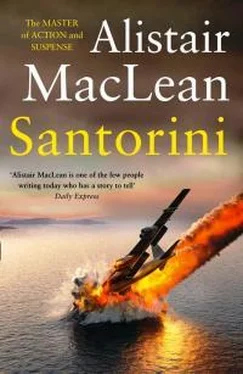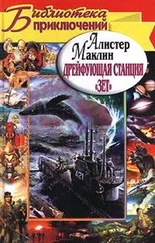‘All we could find. Of interest, I mean.’
‘We have enough.’
‘Dispatch would appear to be the keynote of your investigations, Commander,’ Hawkins said. Glass in hand, he was seated across the wardroom table from Talbot, ‘I mean, you seem to spend singularly little time on your – um – aquatic investigation.’
‘You can find out interesting things in a very short space of time, sir. Too much, for some people.’
‘You refer to our shipwrecked friends?’
‘Who else? Five things, sir. Van Gelder was right, there were no signs of bruising or blood where the engineer had been gashed on the head. An examination of the engine-room turned up no signs of protrusions, angle-beams or sharp metallic corners that could have caused the injury. Circumstantial evidence, I know, but evidence that strongly suggests that the engineer was clobbered by a heavy metallic instrument. No shortage of those in an engine-room. We have, of course, no clue as to the identity of the assailant.
‘Secondly, I’m afraid the owner of the Delos has been guilty of telling you fibs, Admiral. He said he did not abandon the Delos because he was afraid that the reserve fuel tank might blow up. There is no such tank.’
‘Isn’t that interesting. Does make things look a little black for Andropulos.’
‘It does a bit. He could always claim of course that he knew nothing of the layout of the engine-room and had always assumed that there had to be a reserve tank or that in a panic-stricken concern for the welfare of his beloved niece he had quite forgotten that there was no such tank. He’s undoubtedly intelligent, we know he’s a thespian of some note and could put up a spirited and convincing defence in court. But he’d have no defence against a further charge that the explosion was not due to natural causes, unless you regard the detonation of a bomb, almost certainly a plastic explosive, under the main fuel tank as being a natural cause.’
‘Well, well, well. One wonders how he’ll talk his way out of this one. You’re quite certain, of course?’
‘We are wounded, sir,’ Van Gelder said. ‘The Captain and I are developing quite some expertise on the effects of explosives on metal. In the bomber, the metal of the fuselage was blown outwards: in this case the metal of the fuel tank was blown inwards.’
‘We are not explosives experts, sir,’ Talbot said. ‘But it would seem that Andropulos wasn’t either.’ He nodded towards Carrington and Grant. ‘But those two gentlemen are experts. We were talking about it on the way back. They reckon that Andropulos – if it was Andropulos, it could have been Alexander or Aristotle – made an amateurish blunder. They say the villain, whoever he was, should have used what they call an inverted beehive plastic explosive attached to the underside of the tank by a magnetic clamp, in which case more than ninety per cent of the explosive charge would have been directed upwards. It would seem that they didn’t use such a device.’
Hawkins looked at Carrington. ‘You can be sure of this, Chief?’
‘As sure as can be, sir. We do know that he couldn’t have used a beehive. The explosive charge would have been either flat, circular or cylindrical and in any of those cases the disruptive explosive power would have been uniformly distributed in all directions. Grant and I think he didn’t deliberately sink the yacht but that he just, through ignorance, kind of accidentally blew a hole through the bottom.’
‘If it weren’t for the three dead men, this could be almost amusing. As it is, one has to admit that life is full of its little ironies. What’s that you’ve got in front of you there, Carrington?’
‘Some sort of radio, sir. Took it from the Alexander’s cabin.’
‘Why did you take it?’
‘Struck me as odd, sir, unusual, out of place, you might say. Every cabin is fitted with its own bulkhead radio – all probably fed from the central radio in the saloon. So why should he require this additional radio, especially when he had access to – and was probably the only user of – the much superior radio in his radio-room?’
Talbot looked at Denholm. ‘Just a standard radio, is it?’
‘Not quite.’ Denholm took the radio and examined it briefly. ‘A transceiver, which means it can transmit as well as receive. Hundreds of them around, thousands, most commonly as ship-to-shore radios in private yachts. Also used in geological and seismological work and construction building. Remote control detonation.’ He paused and looked around myopically. ‘I don’t want to sound sinister, but it could equally well be used to trigger off the detonator in an explosive device being carried by an American Air Force bomber.’
There was a brief silence, then Hawkins said: ‘I don’t want to complain, Denholm, but you do rather tend to complicate matters.’
‘I used the word “could”, sir, not “did”. On the whole, given the mysterious and inexplicable circumstances, I rather think I prefer the word “did”. If that is the case it leads, of course, to even more mysteries. How did Andropulos or whoever know when, and from where, that bomber was leaving? How did he know its cargo? How did he know an explosive device was being smuggled aboard? How did he know the radio wavelength to set it off? And, of course, there’s the why, why, why.’
The silence was considerably longer this time. Finally, Hawkins said: ‘Maybe we’re doing Andropulos an injustice. Maybe Alexander is the mastermind.’
‘Not a chance, sir.’ Van Gelder was definite. ‘Andropulos lied about the spare tank. He has connections with main centres of known gunrunning activities. The fact that Alexander, who unquestionably plays the role of assistant villain, had the radio in his cabin is of no significance. I should imagine that Irene Charial might be in the habit of dropping in on her uncle occasionally and he wouldn’t want her saying, “Whatever are you doing with a spare radio in your cabin, Uncle?” I can hardly imagine her dropping in on Alexander at any time, far less occasionally. So, Alexander kept the radio.’
‘You mentioned the possibility of an insider at this Air Force base in America, sir,’ Talbot said, ‘I think we should be thinking in terms of a whole platoon of insiders. You will be composing messages for the Pentagon, Air Force Intelligence and the CIA? Suitably etched in acid. I think by this time they must be dreading the thought of another signal from the Ariadne. I don’t see much point in your going to Washington and entering a popularity stakes contest.’
‘The slings and arrows – well, we’re accustomed to injustices. What do you have in that box?’
‘Petty Officer Grant picked this up in Andropulos’s cabin. Haven’t opened it yet.’ Not without difficulty he undid two spring clips and lifted the lid. ‘Waterproof, by Jove.’ He looked at the contents. ‘Means nothing to me.’
Hawkins took the box from him, lifted out some sheets of paper and a paperback book, examined them briefly and shook his head. ‘Means nothing to me, either. Denholm?’
Denholm shuffled through the papers. ‘In Greek, naturally. Looks like a list of names, addresses and telephone numbers to me. But I can’t make sense of it.’
‘I thought you understood Greek?’
‘I do. But I don’t understand Grecian code. And this is what it’s written in – a code.’
‘Code! Damn it to hell.’ Hawkins spoke with considerable feeling. ‘This could be urgent. Vital.’
‘It’s more than likely, sir.’ Denholm looked at the paperback. ‘Homer’s Odyssey. I don’t suppose it’s here just by coincidence. If we knew the connection between the poem and what’s written on those sheets, then cracking the code would be child’s play. But we don’t have the key. That’s locked away inside Andropulos’s mind. Anagrams and word puzzles are not in my line of country, sir. I’m no cryptologist.’
Читать дальше









